Adventures in Roundwood Timber Framing Tools
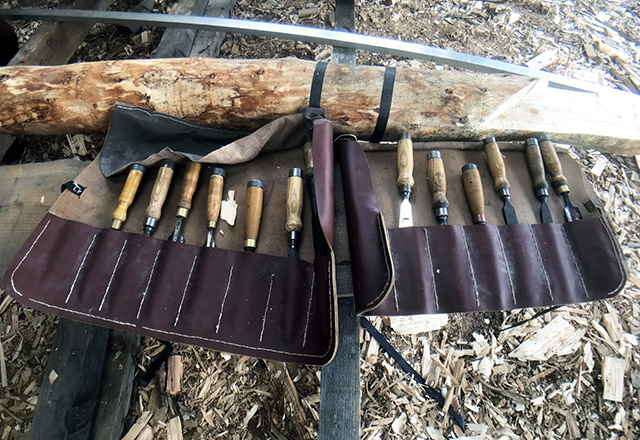
I’m in Canada at the moment, hanging out with family and friends, enjoying the toasty weather, riding my bike, and having a few weeks of laid back summer-y fun. I’m supposed to be working on my Nairobi map to get as much done as possible before I head back to Portugal in mid-July (and then onto Nairobi in late October), but it seems like most of my time is going towards navigating the wonderful and rather overwhelming world of hand tools.
I’ll be heading back to Keela Yoga Farm at the end of July to volunteer for a few months and while I’m there I’d like to spend a bit of my downtime practicing chiseling, sharpening, and experimenting with joining wood. I might even attempt to build some sort of a small structure. I’ve started researching which tools might come in handy and I’ve gone down some sort of a terrifying, tools-related rabbit hole. Just shopping for chisels alone is overwhelming. And don’t even get me started on axes! Don’t!
Starting with an innocent Google search for ‘roundwood timber framing tools‘ led me to videos, lists, blog posts, and all sorts of advice. The internet is a magical place but when you’re going into such a huge topic with just a little more than zero knowledge, it’s easy to start to feel overwhelmed. Hopefully this post will be useful for people who, like me, are totally new to this stuff. Or if you’re experienced and want to chime in with some wise words, I’m listening!
My Tools Buying Strategy
Over on my blog post about my budget for buying land and building, I set aside what is being revealed to be a paltry €750 for tools. I pretty much pulled that number out of my ass so I’m not so surprised that it might be way off, but I’m going to do what I can to keep tool costs low. The Wholewoods build camp showed me how much can be done using hand tools, so I think my plan will be to start with those and then, once I actually have a piece of land, I’ll see what power tools might be useful to add into the mix.
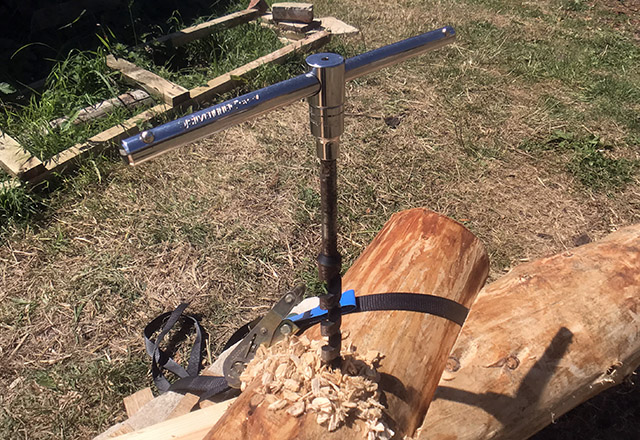
I’m not at all bothered with buying everything new and I’m going to have a look around flea markets and garage sales here in Canada before I head back to Portugal in mid-July. I could spend an absolute fortune on fancy, hand-forged tools from companies like Northmen Guild, Barr or Robert Sorby and maybe one day I’ll satisfy my greatest chisel desires by buying something from one of those companies. In the meantime, my goal is to get functional tools at a good price. I’ll be on the lookout for used tools for cheap and I’m happy to buy items that aren’t top of the range but still come recommended.
There are certain things that I’ll want to pay more to buy once and other items that I’ll buy cheap or mid-range versions and get something better later. My plan is to slowly accumulate tools as the need arises, rather than buying a bunch of things up front. Either way, my inner minimalist is cringing at the idea of buying all of this stuff.
Where to Buy Tools
I’m a bit torn about whether I want to pick up a few things in Canada and lug them to Portugal or if I want to buy locally. My Portuguese builder friend has told me some things in Portugal aren’t as good quality as you can find elsewhere (she gets friends travelling from Germany to bring screws anytime they come, for example) and I don’t want to get there to find badly-stocked tool shops. I really should have had a look around for tools when I was there a couple of months ago. Oops.
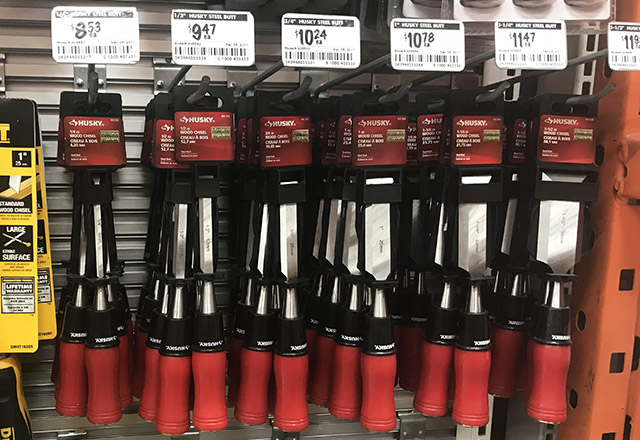
So I guess my options are buying a few small tools that can fit in my luggage in Canada, buying a few more in Portugal, and ordering some tools online. I’ve tried looking at Home Depot and only found a super small selection of crappy, plastic-handled chisels. Fail. But I’m lucky that an excellent specialty woodworking shop called Lee Valley is located nearby in Niagara Falls. It’s a Canadian chain and it’s just close enough to be able to ride my bike. Bike riding and tool shopping… the perfect day? Yes! I’ll take a pedal over there this week, try out some tools in-person (waving axes around and such), and I’m sure I’ll have a much better idea of what I want to do after that.
List of Tools I Want
Below is a list of tools I’d like to eventually buy, divided up into what I think is most urgent, what can wait until later, and a few items that I might not even need at all but might make life easier. If you want to keep track of my purchases, prices, and where I buy things (because what can be more entertaining, really?), check out this glorious in-progress roundwood timber framing tools list.
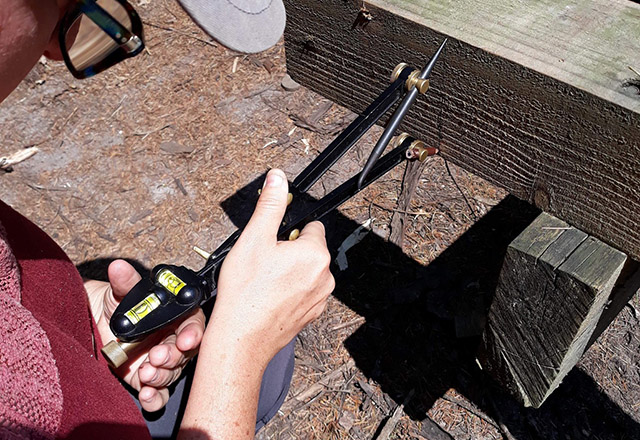
Tools to Buy Soon
These are the bare minimum of tools that will allow me to experiment with timber framing joints and maybe even build a small structure while I’m at Keela Yoga Farm.
- Chisels – These important tools for woodworking can cost up to $150 each if you go for a new, hand-forged chisel or search for something old-school on eBay that’s thought to be an antique. I’d be very happy to pick up a set of used chisels from a flea market or garage sale but if that fails then I’ll be happy with some chisels from Narex which were recommended in this article on FineWoodworking as a great value. Cheap and cheerful works for me and once I get a feel for things maybe I’ll upgrade. But I’m new to this and don’t pretend to need fancy tools. I’ll probably be working with smaller trees on my first projects so would start with 3/4″ and 1 1/2″ chisels and then grow from there.
- Gouge – A gouge is basically a chisel that’s used to create rounded surfaces that are used in a lot of round wood joints. I used a gouge quite often on the Artizans of Wood course so I expect I’ll need one, but I haven’t yet done much research.
- Chisel Roll – This is just some sort of a holder for chisels to they don’t get damaged and so they don’t damage anything they’re stored or packed with. You can get fancy leather ones that are probably the best in the long-run, but since I might only have a few chisels to start, I’ll just get anything cheap that will do the trick.
- Sharpener – This is the one thing I didn’t want to skimp on and a lot of my research over the past couple of days has focused on the best way to sharpen tools (in my case, chisels, an axe, and a draw knife). I checked in with Dylan over at Artizans of Wood (who very nicely offered to be on-call for any building-related questions) who says that he uses the Robert Sorby ProEdge System (which is a clunky, expensive device more suited to being in a workshop) but that his workers all use DMT sharpening stone with a Veritas MK.II Honing Guide. If it’s good enough for them, it’s good enough for me so I decided to spend a bit buying a 8″ Fine/Course DMT DuoSharp Plus diamond sharpening stone. I’m going to skip the honing guide thing for now to see if I can get good at sharpening. I’ve never sharpened a damned thing in my life so this could backfire terribly… but practice makes perfect, right?
- Axe – This one of the tools I’m a bit conflicted about. A few timber frame-y types told me that, with an experienced person on the handle, an axe can do many jobs. I did a bit of axe work at Wholewoods and got a glimpse of the tool’s versatility, but the axe I was using was a bit too large and awkward for me to use well. A few people around Internet-land have recommended Gransfors Bruk axes and I found a super cute little axe that I’d like to give a trial swing or two. Unfortunately, Lee Valley is out of stock until September. Though I’m not sure buying an axe because it’s ‘super cute’ is the best criteria to go on. Plus it costs US$133… so there’s that. I’m still looking at axes and pondering whether to splash out on something I intend to take good care of and have forever and ever, amen. Or if I want to get something more affordable and see how it goes for me. Either way, I’ll for sure want to try it out in person to get an idea of the feel and the weight.
- Draw Knife – This handy little tool can be used to debark trees and also to shave small pieces of wood off bit-by-bit to make pegs, chair legs, and a bunch of other pole-like things. My friend at Mount of Oaks paid €10 to have a draw knife made for her by a local toolmaker because she couldn’t find it in shops in Portugal. She knows a couple of toolmakers who can do all sorts of things so it would be wonderful to have as many tools as possible made locally, starting with a draw knife.
- Mallet – A mallet is used to whack chisels and, so far, I’ve only used ones that have been homemade out of blocks of wood. They’ve been perfectly ok but I wouldn’t have a clue how to make one. Maybe I saw down a block of wood and round out the handle using a draw knife? Or maybe it’s something that has to be made on a lathe? I have no idea but I’ll see if I can figure it out because the homemade ones are great.
Tools to Buy Later
I might find that I’ll want to buy some of these tools straight away but I’ll do my best to hold off for awhile.
- More Chisels – I’ll round to round out my initial chisel purchase with some other sizes. If I can find a good deal on a set of chisels I might just get them all at once. But if I can’t, I’ll just add to the set as needed.
- Sharpening – Depending on whether I suck at sharpening things or not, I might pick up the Veritas MK.II Honing guide mentioned above. It costs around US$70 so I’ll do my best to become awesome at sharpening so that I can skip this purchase.
- Auger Bit – These things are expensive and are important for making peg holes. I’ve only used one that’s about 1/2″ in diameter and it was like butter. Peg holes tend to be 1″ and I’m not sure how difficult that might be to do by hand. Plus I’m not quite sure how to attach a handle to the auger bit itself. Basically, I have no idea whether I want to pick one of these up or not.
- Japanese Saw – This is another ‘I want it because it’s cute’ type of tool. But don’t judge me too harshly because I have actually used Japanese saws in the past and I quite like them. They seem to be more precise than a regular hand saw and I like the idea of buying something that can be cared for and sharpened rather than getting regular hand saws which are often disposable. I have a lot more research to do on saws but these ones are on my radar.
- Slick – A slick is like a giant chisel that’s used to flatten out large areas. It’s a super handy finishing tool and incredibly satisfying to use, but it’s not totally necessary and, with a bit of time and focus, you can get the same work done with a large chisel.
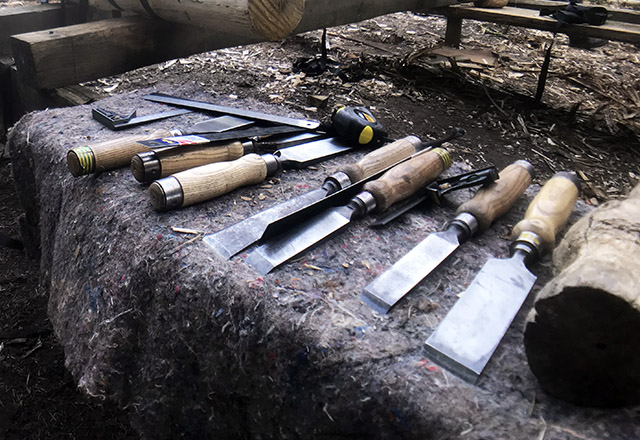
Tools I Already Have or Can (Hopefully) Borrow
I feel like no matter how many tools a person has, there are always more things that can come in handy. Some of the basics useful in timber framing are measuring tools, clamps, marking tools, and so on. My parent’s are downsizing their house and I’ve raided my dad’s tool shed for a few of these things and hopefully I’ll be able to borrow some once I get to Keela.
- Tape Measure
- Level
- Chalk Like
- Framing Square
- Combination Square
- Pencils
- Clamps
- Ratchet Straps
I think that’s all I have to say about tools for now! If you’re into timber framing tools and want to follow along with my purchases and what I’ve spent, check out my list of tools in this other post. which is a work in progress and will be added to as I think of things, learn more, and need more tools.
It’s still very early days but maybe this post will come in handy for other future timber framing self-builders or, at the very least, writing it all down has given me a much better idea of what I need and when!
What do you think of this list? What did I miss? What’s unnecessary? If you’re an experienced woodworker (or even a total beginner like me) and stumble onto this post, I’d love to hear your ideas and suggestions!


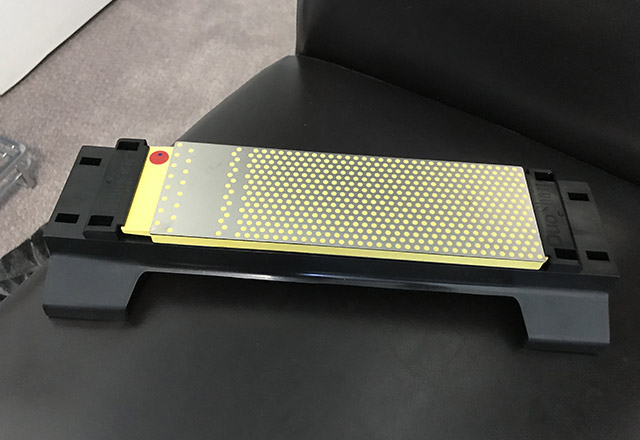
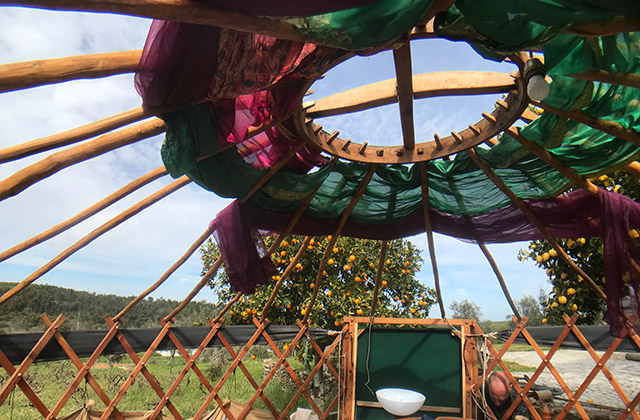

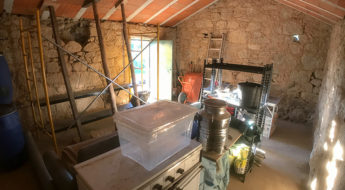

Leave a Comment